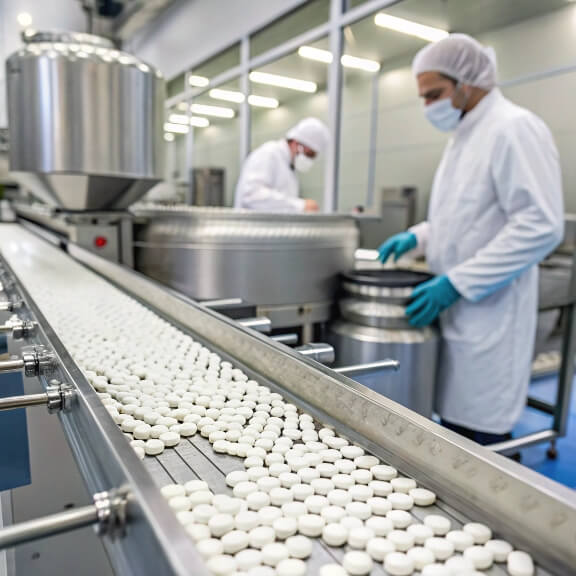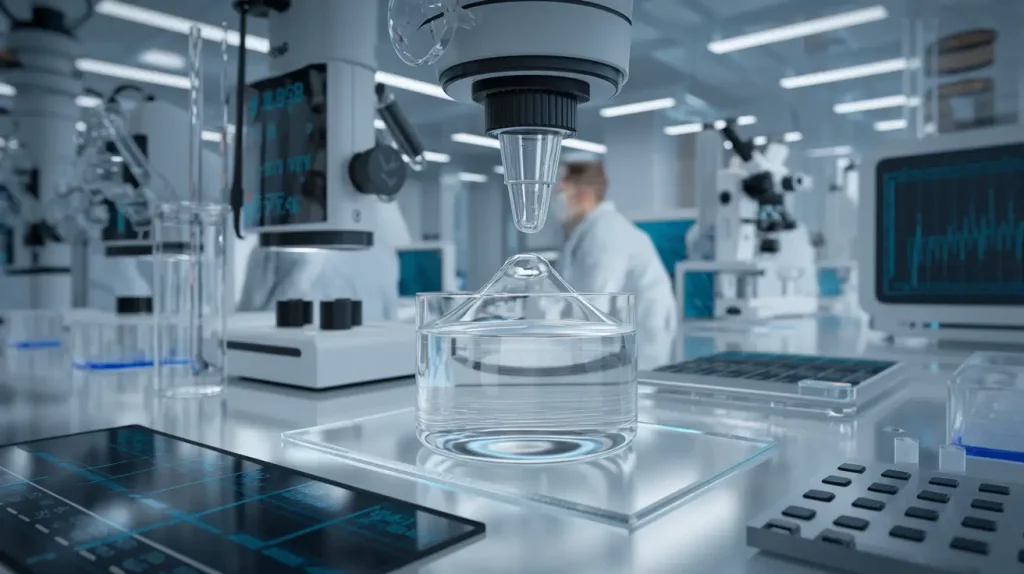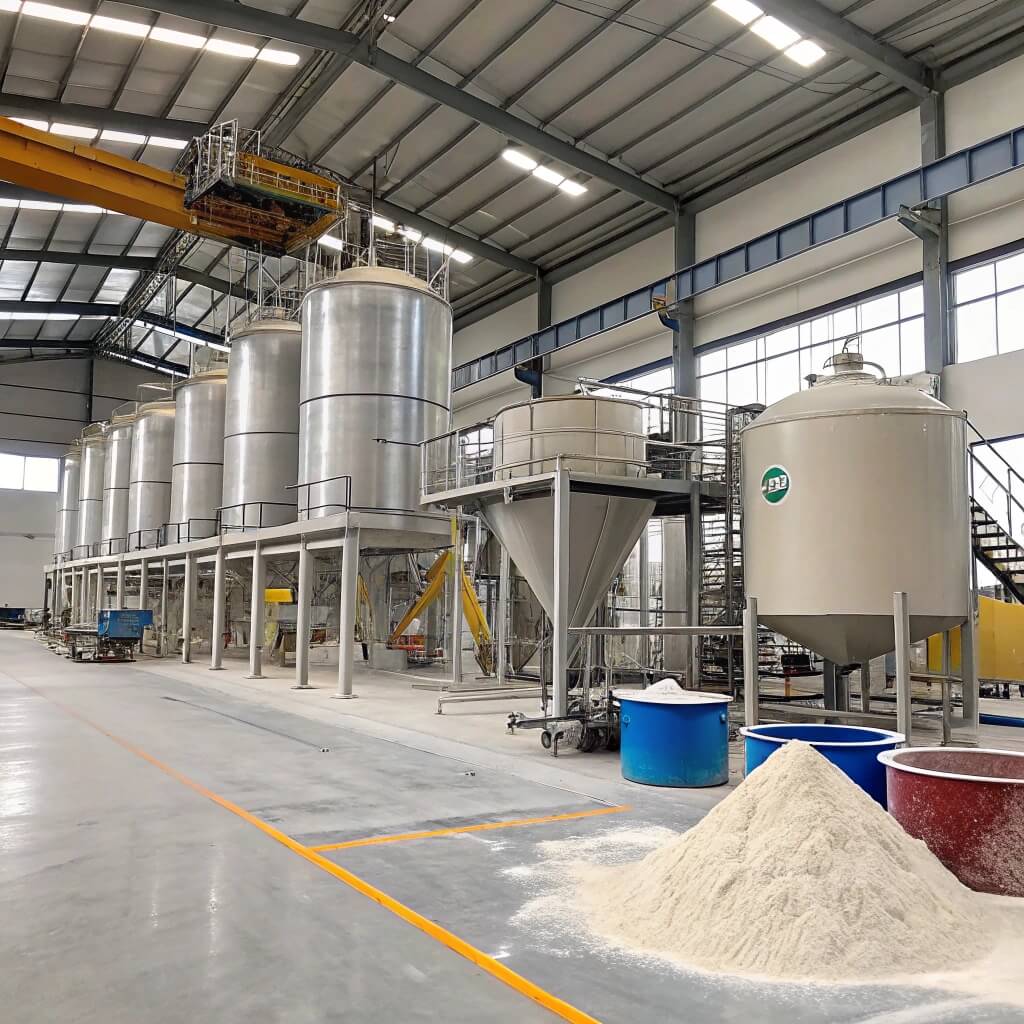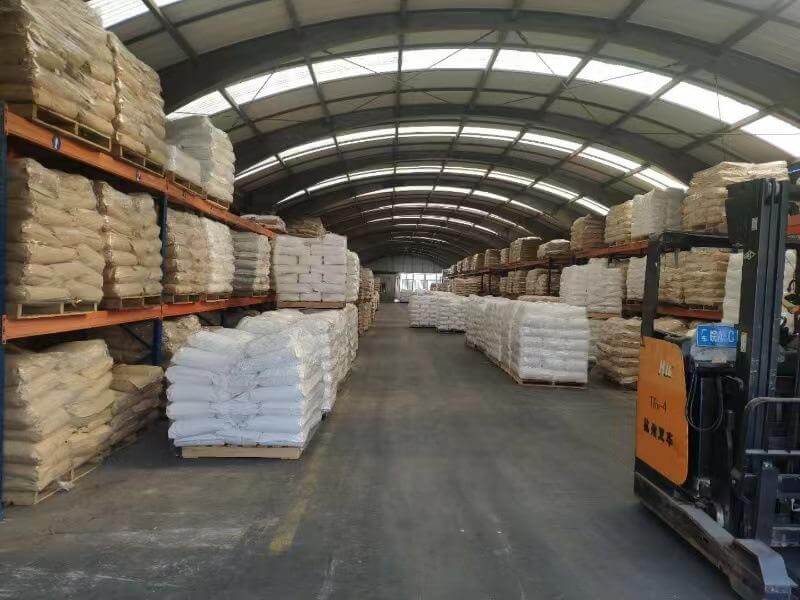Inconsistent tile adhesive performance leads to callbacks, wasted materials, and damaged reputation. Poor workability and premature drying cause expensive failures.
HPMC (Hydroxypropyl Methylcellulose) stands out as the superior choice for tile adhesive formulations due to its exceptional water retention, bonding strength, and workability enhancement, creating a reliable foundation for successful tiling projects.
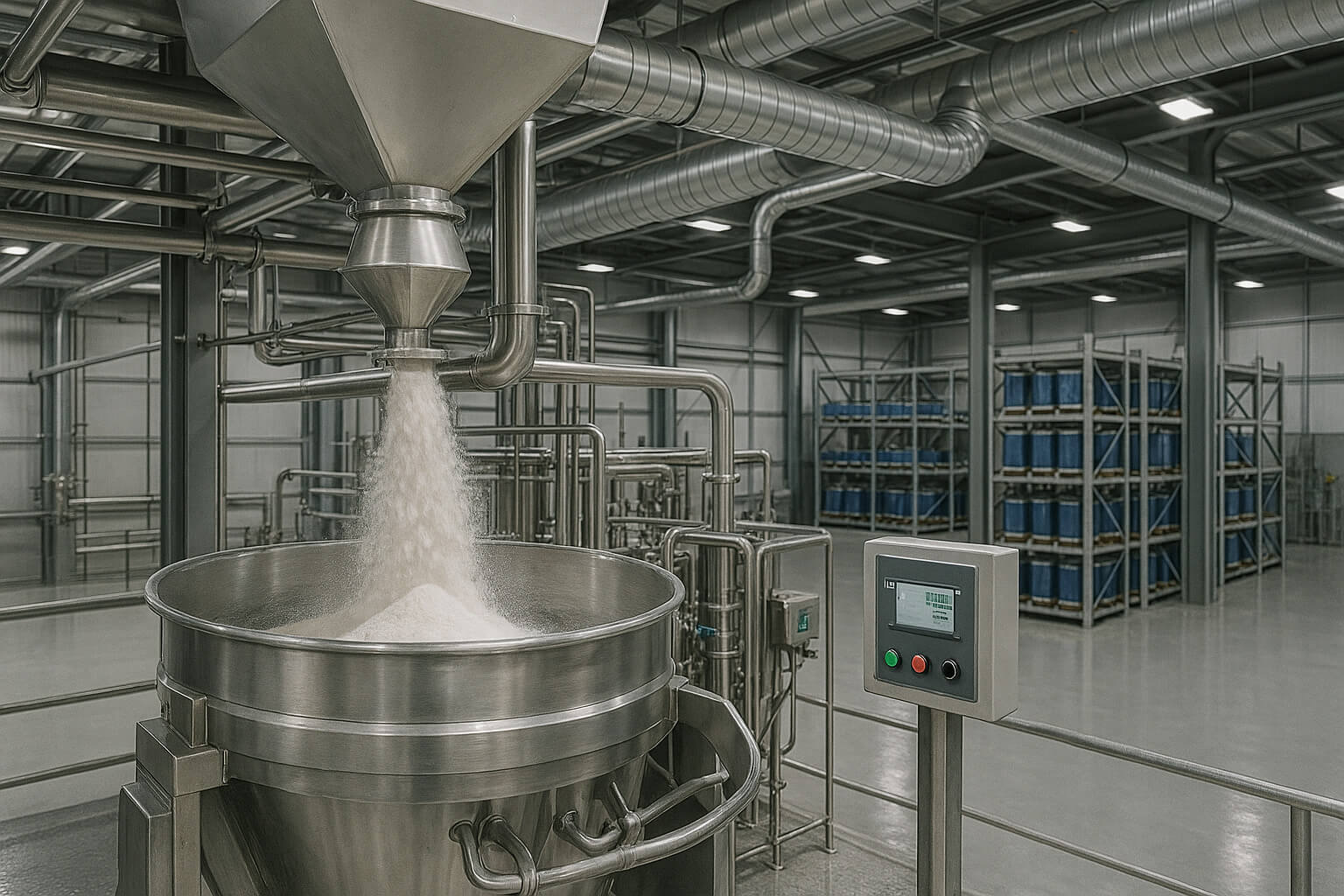
This image shows high-quality HPMC powder being professionally mixed into a tile adhesive formulation in a modern production facility.
Many tile installation failures stem from incorrect adhesive formulation. Let's explore why HPMC has become the go-to cellulose ether for professional tile adhesive manufacturers worldwide.
What are the core benefits of using HPMC for tile adhesive?
Substandard additives lead to poor adhesion, sagging tiles, and costly rework. Your customers expect consistent, reliable performance.
HPMC delivers superior water retention, extended open time, enhanced adhesion, slip resistance, and improved workability compared to other cellulose ethers and alternative additives used in tile adhesives.
We've tested numerous cellulose derivatives in our lab, and HPMC consistently outperforms others for tile adhesive applications. Our testing shows HPMC grades with viscosity ranges of 100,000-150,000 mPa·s provide optimal balance between workability and adhesion strength. This makes HPMC the preferred choice for manufacturers focused on quality.
The right HPMC grade transforms ordinary cement-based adhesives into high-performance products. Most professional tile setters can immediately feel the difference when working with HPMC-enhanced adhesives. The creamy consistency allows for smoother troweling, better ridge formation, and reduced fatigue during application.
| Свойство | ГПМЦ | MC | КМЦ | Other Additives |
|---|---|---|---|---|
| Удержание воды | Отличный | Хороший | Умеренный | Poor to Moderate |
| Открытое время | 20-30 min | 15-20 min | 10-15 min | 5-15 min |
| Сопротивление скольжению | Высокий | Умеренный | Low to Moderate | Variable |
| Прочность сцепления | Superior | Хороший | Умеренный | Variable |
| Стабильность pH | Отличный | Хороший | Ограниченный | Variable |
Our production team consistently achieves tile adhesive formulations with 20-30% higher adhesion strength when using optimized HPMC grades compared to basic cellulose additives. For construction projects where failure isn't an option, HPMC provides the reliability professionals demand.
How does HPMC improve workability and application of tile adhesives?
Struggling with stiff, hard-to-spread adhesives wastes time and causes installer fatigue. Poor workability leads to uneven coverage and bond failures.
HPMC creates a smooth, creamy consistency that allows for effortless troweling, consistent ridge formation, and optimal wetting of tiles, significantly improving application efficiency and reducing installer fatigue.
Through years of manufacturing experience, we've observed that HPMC dramatically improves the rheological properties of tile adhesives. It creates thixotropic behavior - the adhesive flows easily under pressure but stays in place once applied. This property is crucial for wall applications where slip resistance matters.
Installers often tell us that HPMC-modified adhesives feel "buttery" under the trowel. This tactile quality comes from HPMC's unique molecular structure that helps cement particles disperse evenly while maintaining optimal water content. The result is a smooth application that spreads easily without being too runny or too stiff.
- Better air entrainment for smoother mixing
- Reduced drag when troweling
- More uniform ridge formation
- Easier adjustment of tiles after placement
- Consistent performance across temperature variations
We closely monitor feedback from professional tile installers who use adhesives containing our HPMC. They consistently report reduced arm fatigue during long installation jobs - a real benefit that impacts productivity. The improved workability also means more consistent coverage, reducing the risk of hollow spots under tiles.
Why is HPMC superior in water retention and bonding strength?
Premature drying causes weak bonds and tile failures. Some additives can't hold enough moisture during critical curing phases.
HPMC forms a protective gel network that controls water evaporation, ensuring cement has sufficient moisture for complete hydration while creating stronger polymer bridges between tiles and substrate than alternative additives.
Water retention stands out as HPMC's most critical function in tile adhesives. When we test different cellulose ethers in our lab, HPMC consistently retains 15-20% more water than alternatives like plain methylcellulose. This makes an enormous difference in real-world applications, especially in hot or windy conditions.
Our testing reveals that HPMC creates a more uniform moisture profile throughout the adhesive layer during curing. Unlike some additives that allow rapid surface drying, HPMC maintains moisture evenly. This results in more complete cement hydration and ultimately stronger bonds. The American National Standards Institute has established performance requirements for tile adhesives that highlight the importance of these properties.
HPMC also forms polymer bridges between the tile and substrate. These microscopic connections enhance the mechanical bond beyond what the cement alone provides. We've measured up to 30% improvement in shear bond strength in HPMC-enhanced formulations compared to those using alternative water-retaining additives.
When installing natural stone or large-format tiles, this superior bonding strength becomes even more crucial. The enhanced adhesion helps prevent tiles from detaching due to thermal cycling, structural movement, or heavy loads. Professional installers trust HPMC-modified adhesives for challenging applications where failure risks are high.
What makes HPMC an ideal choice for formulation stability and consistency?
Batch variations and poor stability create nightmares for quality control. Inconsistent performance damages trust and reputation.
HPMC provides exceptional thermal gel stability, pH tolerance, and compatibility with cement chemistry, ensuring consistent performance from batch to batch and maintaining reliable shelf life even under varying storage conditions.
Consistency stands as a crucial factor for tile adhesive manufacturers. Through our decade of HPMC production, we've engineered our products for minimal batch-to-batch variation. This creates predictable performance that manufacturing teams can rely on - something crucial for quality control departments dealing with international certifications and standards.
HPMC remains stable across a wide pH range (3-12), making it compatible with various cement formulations and additives. This stability means fewer unexpected interactions between components, reducing formulation challenges for product developers. According to researchers at the International Union of Laboratories and Experts in Construction Materials, this chemical stability contributes significantly to long-term durability.
Our production engineers have also perfected delayed-dissolution HPMC grades specifically for tile adhesives. These specialized products don't activate immediately upon water contact, allowing complete dispersion of all dry ingredients before the HPMC begins forming its gel network. This prevents the formation of "fish eyes" (undissolved clumps) that plague many alternative additives.
The storage stability of HPMC-enhanced products also exceeds alternatives. Properly formulated adhesives using our HPMC can maintain consistent performance for 12-18 months - significantly longer than formulations using less stable additives. This extends shelf life and reduces waste for both manufacturers and contractors.
How does HPMC contribute to long-term durability and eco-friendly construction?
Environmental concerns and durability requirements create dual pressures on adhesive formulations. Contractors need products that last without harming health.
HPMC promotes thorough cement hydration for maximum strength development while being non-toxic, biodegradable, and contributing to lower VOC formulations that comply with green building standards and indoor air quality requirements.
We've invested heavily in testing the long-term performance of adhesives containing different HPMC grades. The results consistently show that proper water retention during curing leads to more complete cement hydration, resulting in stronger, more durable bonds that resist cracking and deterioration over time. The Green Building Council recognizes these durability benefits as contributing to sustainable construction.
Unlike some synthetic additives, HPMC contains no harmful plasticizers, phthalates, or formaldehyde. It's derived from natural cellulose and modified through processes that yield a safe, environmentally acceptable product. This matters increasingly to green building certifications and health-conscious specifications.
HPMC also helps manufacturers meet stringent VOC (Volatile Organic Compound) requirements without sacrificing performance. Many traditional adhesive additives contain solvents or components that release VOCs during curing. HPMC-based formulations can achieve near-zero VOC content while maintaining excellent technical performance.
We see growing demand for eco-friendly construction materials that don't compromise on performance. HPMC strikes this balance perfectly - enhancing technical properties while supporting manufacturers' sustainability goals. This dual benefit makes HPMC particularly valuable for projects seeking LEED certification or similar environmental credentials.
What should you consider when sourcing HPMC from suppliers?
Selecting poor-quality HPMC leads to inconsistent results, production headaches, and customer complaints. The market contains wide quality variations.
Key Selection Criteria for HPMC Suppliers
When evaluating HPMC suppliers, focus on consistent viscosity specifications, reliable substitution degree, thermal gelation temperature, and particle size distribution that matches your production equipment and end-product requirements.
Our factory has supplied HPMC to major tile adhesive manufacturers for over a decade. Through this experience, we've identified critical factors that separate high-quality HPMC from substandard products. Foremost among these is viscosity consistency between batches. Even minor variations can affect workability, water retention, and open time - properties that professional installers immediately notice.
The degree of substitution (DS) and molar substitution (MS) directly influence how HPMC performs in cement-based systems. These chemical parameters determine water retention capacity, dissolution rate, and compatibility with other ingredients. Reputable manufacturers like us provide detailed specifications and can explain how these values affect your specific application.
- Verify supplier's quality control procedures and testing frequency
- Request technical data sheets with complete specifications
- Check for certifications relevant to construction applications
- Evaluate particle size distribution for your mixing equipment
- Assess supplier's technical support capabilities
- Consider manufacturing capacity for supply chain reliability
We recommend testing samples from multiple suppliers in your actual formulation before making purchasing decisions. This practical approach reveals how different HPMC products perform in your specific manufacturing process and end-use conditions. The International Organization for Standardization provides guidelines for evaluating construction material components that can help structure this assessment.
Many adhesive manufacturers have found that working with specialized HPMC suppliers who understand construction applications provides better results than buying from general chemical distributors. The technical support, application knowledge, and consistent quality justify establishing direct relationships with manufacturers focused on construction-grade HPMC.
Часто задаваемые вопросы
Что такое HPMC для плитки?
HPMC for tiling is a cellulose ether powder that functions as a key rheology modifier and water retention agent in cement-based tile adhesives. It creates thixotropic behavior (easy spreading under pressure but stays in place afterward) and extends open time by forming a protective gel network that prevents premature water evaporation.
Какой клей используют профессиональные плиточники?
Professional tilers primarily use cement-based adhesives modified with HPMC for most applications. For standard projects, they choose C1 or C2-rated thin-set mortars containing 0.2-0.5% HPMC. For challenging installations like large-format tiles or exterior applications, they select premium C2TE or C2TES1-rated adhesives with higher HPMC content (0.4-0.6%).
Какова функция покрытия HPMC?
While not actually a "coating," HPMC in tile adhesives forms a molecular network throughout the cement mixture. This network serves multiple functions: controlling water movement, improving adhesion to both porous and non-porous surfaces, creating slip resistance for wall applications, and enhancing the adhesive's ability to wet the tile backing for complete contact.
What does HPMC do?
HPMC performs several critical functions in construction materials: it retains water for proper cement hydration, improves workability and spreadability, extends open time, enhances adhesion strength, provides sag resistance for wall applications, increases freeze-thaw stability, and creates air entrainment for better mixing and application properties.
Заключение
HPMC stands as the definitive choice for quality-focused tile adhesive manufacturers. Its unique combination of water retention, workability enhancement, and bond strength improvement delivers the performance that professional installers demand. The consistency and reliability of HPMC-modified adhesives translate directly to successful installations with fewer callbacks.
We've observed firsthand how the right HPMC grade transforms ordinary cement formulations into premium adhesives. The science is clear: HPMC outperforms alternative additives across key performance metrics that matter in real-world applications.
Contact Morton today to discuss your specific tile adhesive formulation needs. Our technical team can recommend the optimal HPMC grade for your production process and performance requirements, with samples available for testing in your laboratories.

